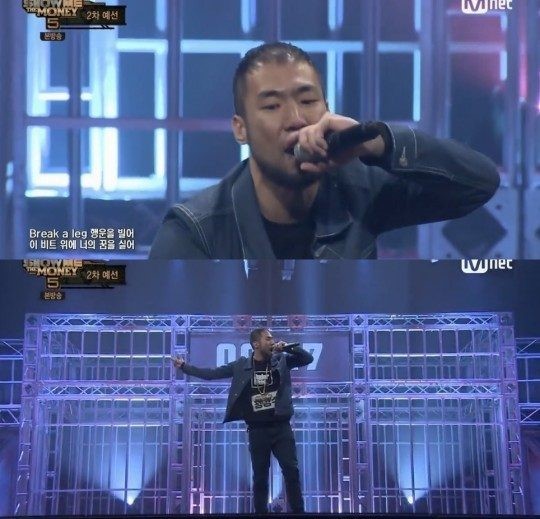Crimes by stars of a popular rap competition program risk tarnishing the genre’s reputation in the country
Rapper Jung Sang-soo, who made his name via popular Mnet program “Show Me the Money,” was recently charged with sexual assault, police said Wednesday.
According to Ilsan Dongbu Police Station, Jung is accused of sexually assaulting a woman, who was intoxicated, at his home, although he claimed it had been consensual. Investigators have sent the case to the prosecutors, recommending that he be indicted.
This is only the latest in the long line of troubles that the musician -- famous for his old-school-style rapping -- has had with the authorities, including multiple cases of drunken violence, drunk driving, and assault.
 |
Jung Sang-soo raps on Mnet’s “Show Me the Money” (Mnet) |
The news also came two days after news that another “Show Me” star C Jamm was arrested for marijuana use.
Another rapper from the show, Vasco, has been booked without detention, also on drug charges. Last year, Iron -- the runner-up in the season three of the show -- received a suspended prison term for assaulting his girlfriend.
With hip-hop in Korea still in the early stages of being regarded as a mainstream music genre, the continued allegations of crimes involving hip-hop musicians run the risk of giving the genre a bad name.
Hip-hop in Korea Hip-hop in Korea is perceived negatively, mainly due to the public’s perception of the lyrics that often use hateful or misogynistic language.
The genre’s culture of “dissing” -- rappers trading insults with each other in their lyrics -- has not transferred easily to a country with so much emphasis on respect. For example, the language uses a whole different set of words and honorifics when addressing one’s elders, even if that “elder” is just one year older.
Earlier in the year, rapper Black Nut was indicted without arrest for writing misogynistic lyrics. About a fellow female rapper KittiB, he wrote that he wouldn’t “hit that even if it was given to me,” along with other sexually-suggestive lyrics.
Culture critic Gang Il-gwon, the editor-in-chief of hip-hop magazine Rhythmer, wrote that a discussion of foul language used in the genre shouldn’t be glossed over in the name of “freedom of expression.”
Rappers’ reputation in peril?Rapper and producer Deepflow pointed out that popular shows like “Show Me the Money” and its sister programs such as “Unpretty Rapstar” have helped reduce prejudice against the genre.
“Ten years ago, many Koreans’ perception of a rap song was ‘just a bunch of mumbling.’ Now your girlfriend’s father can tell what is and isn’t a good rap song,” he said, in a previous interview with The Korea Herald.
But while the public’s perception of rap has grown favorable via these shows, wrongdoings by some “Show Me the Money” rappers have contributed to negative views toward the genre in general.
Before being taken to Suwon Detention Center, C Jamm posted a photo and a message on his social media page about him “going in after finishing recording.” Teenage rapper Yun Byung-ho replied by “I love you, take care.”
The seemingly nonchalant attitude sparked controversy online that the rappers do not take seriously the magnitude of their crimes. This coupled with the “freedom of expression” debate over the misogynistic lyrics hurt the genre’s reputation.
Rapper Mino of Winner apologized for his lyrics on “Show Me” about women “spreading legs like you’re at the gynecologists’,” but later rapped in another song “they say it’s hate just over saying ‘Motherf-----, s---.”
Whether an artistic value can be separated from the artists’ personal misdeeds is a decades-old controversy spreading across continents.
But knowing that the person who sang your favorite song is behind bars does affect how you enjoy that song.
Culture critic Jeong Byeong-wook wrote that while art is evaluated on its own merit, it is inevitable that the assessment of the artist be connected to how the public sees that art.
“No matter what values something holds, if its creator’s immorality gets in the way of (the public) being immersed in its beauty, it can only be a half-completed piece that is isolated from the society,” he said.
Such reputation, brought forth by hip-hop’s most well-known stars, can be particularly hurtful for a genre that just recently broke free from the shackles of years-long prejudice.
By Yoon min-sik (
minsikyoon@heraldcorp.com)





![[Exclusive] Hyundai Mobis eyes closer ties with BYD](http://res.heraldm.com/phpwas/restmb_idxmake.php?idx=644&simg=/content/image/2024/11/25/20241125050044_0.jpg)
![[Herald Review] 'Gangnam B-Side' combines social realism with masterful suspense, performance](http://res.heraldm.com/phpwas/restmb_idxmake.php?idx=644&simg=/content/image/2024/11/25/20241125050072_0.jpg)

